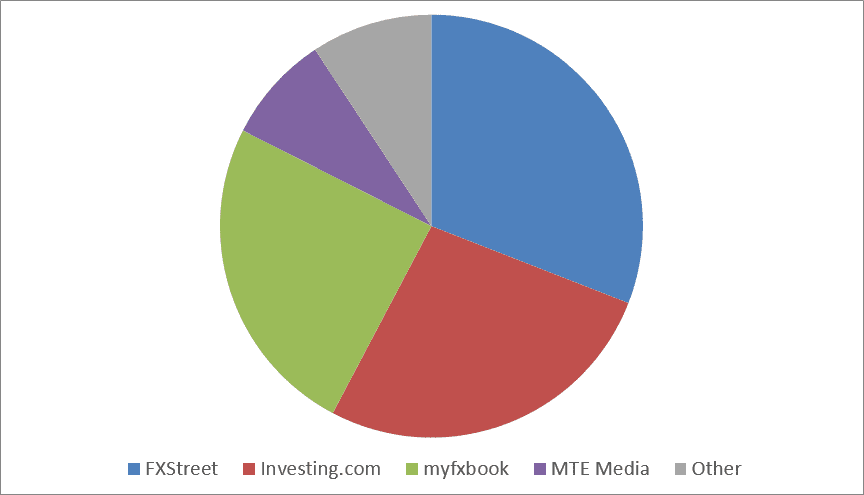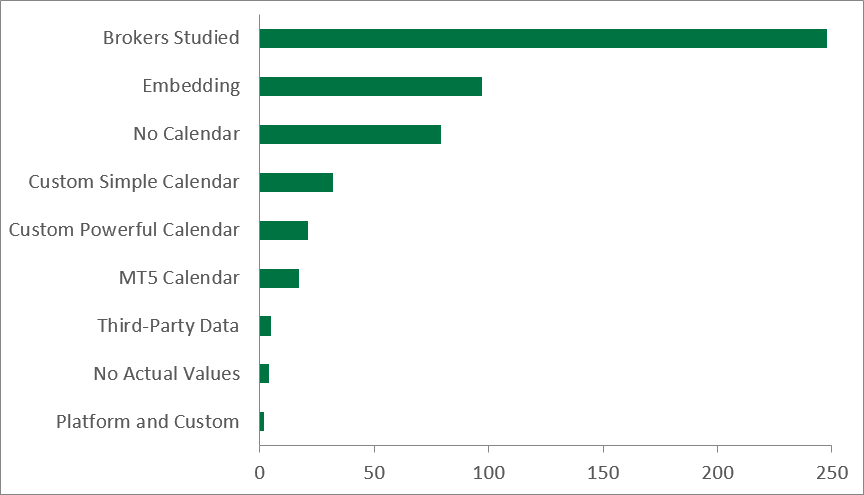Not all retail forex brokers are the same. And not all brokers make use of economic calendars in the same way. In fact, some don’t provide them at all to their clients.
What should my brokerage firm do?
We present a special guest post by EarnForex.com on the subject of Forex Brokers and Economic Calendars, including their detailed review of 248 (!!) brokers and what they do and don’t offer.
An Economic Calendar helps a trader to make proper investment decisions. It is a popular tool among currency traders. Forex brokers usually offer free economic calendars. Such calendars come in a lot of different flavors. This article will help you understand how brokers approach to providing Forex calendars to their clients. For this study, we have checked the websites and platforms of 248 retail and institutional brokers.
The rationale behind offering a distinct economic calendar is primarily to simplify the process of studying an event data and simultaneously attract new clients with superior design. However, as described below, not every broker adopts this strategy.
No calendar
Even though all financial markets are affected by macroeconomic data, the Forex market is, arguably, impacted the most. The reason is that an event data ultimately affects the flow of funds from one currency to another. Based on this, we can argue that a Forex broker’s website would be unattractive without an economic calendar. However, there can be some reasons for a Forex broker to avoid providing an economic calendar:
- The Forex broker may be primarily catering to institutional clients who would definitely use only a Bloomberg terminal or a real-time Reuters data (Eikon) feed to make their investment decisions.
- Example: Advanced Markets.
- Advantage: The approach avoids unnecessary burden on the server.
- Disadvantage: Retail clients may shy away from signing up with such a broker.
- According to industry sources, the average account size of a retail trader in the USA is about $3,500-$4,000. However, the cost of acquiring a new trader is more than $500. Thus, an upcoming Forex broker may not be interested in spending money to build or embed a calendar.
- Example: Forex broker Axiory is a good example of this scenario. The website of Forex broker Corespreads explicitly says cost cutting as the main reason for avoiding the economic calendar and so many other freebies.
- Advantage: Decreases operational costs.
- Disadvantage: May create a feeling that the Forex broker is not financially healthy.
- Conversely, a Forex broker serving only clients with large accounts size may not provide an economic calendar. It is based on the assumption that large scale private traders and small funds would certainly have their own low cost unbundled data feeds from relatively new startup companies such as Symphony.
- Example: 3TG Brokers.
- Advantage: Cuts operational costs and decreases server load.
- Disadvantage: Small retail traders would find it unimpressive.
Out of the 248 Forex brokers we took for research, 79 do not provide any kind of economic calendar.
Embedded third-party calendar
The majority of Forex brokers fall under this category. The approach serves two purposes. Firstly, a retail client who enters currency trading with a small investment size of, let’s say, $500 cannot afford a subscription based feed. Such trader can be attracted by the availability of even the simplest economic calendar. Secondly, the approach will not put a hole in the Forex broker’s budget.
We were able to find 97 Forex brokers using embedding approach. There are three major and two minor players offering their economic calendars for embedding. The major ones are FXStreet, myfxbook, and Investing.com. The minor competitors are MTE Media and Econoday.
The calendar offered by Investing.com seems to be the preferred choice of the majority of Forex brokers. As many as 30 companies have embedded their economic calendar in their website. This is closely followed by FXStreet’s calendar, which is embedded by 26 Forex brokers. Myfxbook’s economic calendar is embedded by 24 Forex brokers. It is a known fact that myfxbook uses FXStreet’s data. Considering this fact, we can argue that FXStreet is the numero uno service provider for embedded Forex calendars.
The calendar offered by MTE Media is used by 8 of the 248 Forex brokers taken for research. Econoday’s calendar is used by 4 brokers.
The custom economic calendar of Dukascopy Forex broker is embedded by the FXFINPRO in its website. On the other hand, VantageFX and Infin Markets have embedded the economic calendar of WBPonline.com and DailyFX respectively. Similarly, the Russian Forex broker Finam has opted for using an economic calendar of another broker – FXPro.
Advantage: Reduces overhead expenses for the Forex broker and simplifies the task.
Disadvantage: Smart traders would certainly look for the source of economic data, which may work against the broker’s interest in the long-term.
Calendar based on third-party data
The reasons for brokers to offer a calendar based on third-party data include:
- A broker may not be happy with the layout of the economic calendar offered by other sources.
- A broker may not be interested in indirectly acting as an affiliate of another broker. For example, a retail trader who comes across the FXStreet’s calendar offered by a Forex broker would eventually visit FXStreet’s website. With competition getting intense day-by-day, naturally, the broker will try to conceal the fact of embedding third-party data from clients.
- The Forex broker may lack the financial resources to get a direct data feed from a primary source but may have sufficient software engineers to design a better layout.
Fort Financial Services and Super Forex are among the Forex brokers who have adopted this approach. These two Forex brokers receive the data from the FXStreet but use a custom layout. The greatest advantage is the uniqueness it offers to the broker’s website. However, the calendar offers only the basic features.
The approach of Forex.com seems to be much better. It uses the data feed provided by Econoday. Barring historic charts, it provides all the relevant details regarding economic events.
Similarly, UMOFX and NSFX use the data provided by DailyFX and Dukascopy respectively.
Only 5 Forex brokers use this approach.
Advantage: Provides uniqueness to the webpage.
Disadvantage: May increase calendar display lag.
Custom calendar without actual event data
It looks quite odd, but there are Forex brokers who offer custom calendar without the actual event data. Only the forecast and previous values are presented in a simple fashion. The reason for providing such a kind of economic calendar is unknown and quite hard to fathom as well. However, they do exist. Among the 248 brokers we researched, 4 companies have opted to present an economic calendar without the actual event data. They are AGEA, Forex Ukraine, Real Trade, and UMOFX.
Custom but simple calendar
A Forex broker may offer a custom calendar without any advanced features (such as calendar browsing or export facility) due to the following reasons:
- There may be plans to upgrade the calendar in case demand for additional features increases in the future.
- Resource constraints, including but not limited to lack of additional servers or funds.
Some of the prominent Forex brokers offering custom calendars are Exness, ActivTrades, AMarkets, ATIG, FIBOGroup, Forex Optimum, and Forexite. Out of the 32 Forex brokers offering custom but simple calendar, only 19 provide some kind of calendar browsing facility. The statistics does not include the simple calendars of Forex brokers using external data feeds.
Advantage: Offers uniqueness to the webpage. Furthermore, the Forex broker is in complete control of the calendar. The company can modify the calendar as and when required.
Disadvantage: Traders may get disappointed when a custom calendar lacks additional features.
Custom but powerful calendar
Well-established and popular Forex brokers offer custom calendars with a multitude of features. A close look at the brokers will reveal that most of them are regulated in highly reputed jurisdictions. Apart from the huge capital requirements, only a Forex broker with high-standard business practice can receive license from such strict authorities as FCA, CFTC/NFA, ASIC, etc. These brokers usually cater to a huge number of retail and corporate clients. For such companies, it is a plain necessity to offer an economic calendar. A Forex broker churning out huge daily volume in the currency market will have no hesitation in spending money to create a custom calendar that will be a hallmark of the website.
Some of the prominent brokers who have taken the path described above are DirectFX, Dukascopy, DF Markets, FCI Markets, Oanda, and Windsor Brokers. Only 21 Forex brokers of those studied for this article offer a powerful calendar with historic charts. Two Forex brokers (Deltastock and FXRanex) allow only their clients to access such a calendar. Another Forex broker, ETX Capital, offers its custom calendar only to the clients trading binary options.
Advantage: Makes a Forex broker’s website very attractive to both retail and corporate clients.
Disadvantage: Increases the operational expenses of the Forex broker. Ultimately, the clients would bear the brunt in the form of higher commission or spreads.
Calendar inside proprietary trading platform
Only a company with a huge capital base can resort to creation of a custom trading platform, which would be aimed at satisfying particular needs of the clients they target. Adding a built-in calendar into such platform is not an easy task. Only Forex brokers who wish to gain huge market share in the long-run would put such an effort.
There are two Forex brokers who are offering powerful calendars in their proprietary trading platform. They are Bestec NFX and CMC Markets. CMC Markets use Thomson Reuters data feed.
Advantage: Enables a broker to create a huge client base in the long run.
Disadvantage: Custom platform is a double-edged sword. Traders who are used to popular platforms may not find it attractive.
MetaTrader 5 calendar
The MT5 platform is the flagship platform by MetaQuotes Software Inc. Compared to its predecessor, MetaTrader 4, it is yet to gain popularity. One of the important features of the platform is the built-in economic calendar. It can be either enabled or disabled by a Forex broker. Out of 22 Forex brokers offering MetaTrader 5, only 17 have economic calendars enabled in the platform. This includes such brokers as ActivTrades, Alpari, FIBOGroup, RoboForex, and others. Alfa-Forex, Exness, Swissquote are among those who do not offer economic calendars within their MT5 platform. Seven of the brokers offering MT5 platform also provides a custom calendar on their websites. Examples include FIBOGroup, RoboForex, and Swissquote.
Conclusion
From the point of view of the retail trader, it should be remembered that the broker’s quality of service is not limited to the company’s approach to providing an economic calendar. Thus, it is up to the individuals to choose the best broker, considering the full range of their trading needs and other requirements. From the brokers’ point of view, providing at least some economic calendar solution seems like a necessary step to remain competitive.


